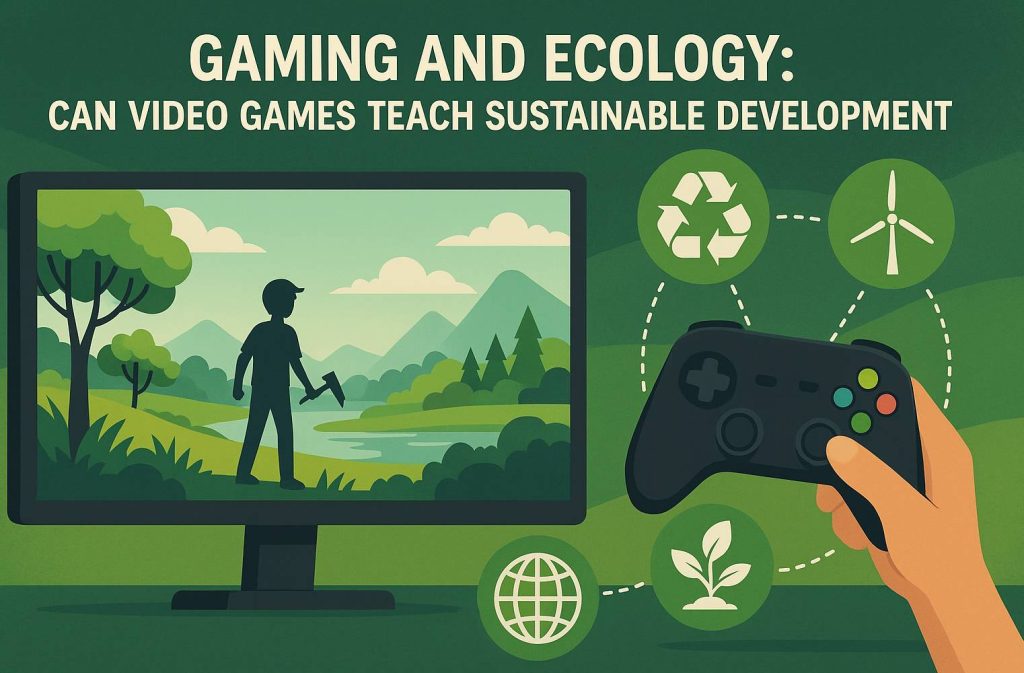The relationship between gaming and ecology might not seem obvious at first glance, yet over the past decade, video games have evolved into a powerful medium capable of educating players about environmental issues and influencing real-world behavior.
As global conversations increasingly revolve around topics like climate change, resource scarcity, and environmental degradation, video games have emerged as unexpected allies in promoting awareness and responsibility.
Through immersive storytelling, complex world-building, and interactive systems, they offer players opportunities to experience firsthand the consequences of their choices on virtual ecosystems — lessons that often resonate far beyond the screen.
Developers and educators alike now recognize gaming’s potential as a tool for social transformation. Titles that incorporate themes of sustainability, conservation, and ecological balance have become more than entertainment; they function as simulations of our planet’s fragile systems.
When players must manage limited resources or witness the impact of industrial overproduction in-game, they learn about the interconnectedness of nature, economy, and society in a way that traditional media cannot replicate. With the gaming industry’s reach extending to billions of users worldwide, the potential for change is unprecedented.
The rise of environmental awareness in gaming

The first seeds of ecological thinking in gaming can be traced back to early simulation titles like SimCity and Civilization, which encouraged players to consider how resource management, pollution, and population growth affected their virtual cities or empires.
Over time, these concepts evolved into deeper and more explicit explorations of environmental issues. Modern titles such as Eco, Terra Nil, Surviving Mars, and ABZÛ go beyond simple mechanics, incorporating sustainability as a core theme that affects gameplay and player decision-making.
In Eco, for example, players must build a functioning society without destroying the ecosystem that sustains them. Every tree cut or piece of land tilled affects global balance, pushing players to cooperate and establish laws that preserve resources.
Similarly, Terra Nil turns the usual city-building formula upside down: instead of constructing industrial empires, players restore barren wastelands to lush, thriving habitats. These games challenge players to think about progress not as expansion, but as restoration — a message that aligns perfectly with real-world sustainability principles.
Educational institutions have begun integrating such titles into their teaching methods, using them as tools to illustrate topics like renewable energy, carbon footprints, and biodiversity.
Students are more likely to engage with and retain complex ecological concepts when they can interact with them dynamically. This form of experiential learning transforms sustainability from a theoretical concept into a living system that reacts to every action the player takes.
How live gaming and streaming amplify eco-conscious messages

The rise of streaming platforms has amplified gaming’s impact on environmental awareness. Sites like Twitch, YouTube Gaming, and Facebook Live have turned gaming into a global social event, where influencers and professional players can reach audiences of millions.
Streamers not only entertain — they also educate and advocate. By discussing sustainability topics, participating in eco-friendly charity events, or showcasing environmentally themed games, they shape cultural attitudes and inspire collective action.
Charity streams have become one of the most powerful examples of this synergy. Events like #TeamTrees and #TeamSeas have mobilized the gaming community to raise millions of dollars for reforestation and ocean cleanup projects.
Esports teams have joined similar campaigns, using their visibility to draw attention to urgent ecological causes. For instance, some tournaments have adopted zero-waste policies or pledged to offset the carbon emissions produced during major international events.
Moreover, platforms that specialize in broadcasting esports, such as cs2 watch live, play an indirect but essential role in this movement. By integrating sustainability campaigns or eco-conscious branding into competitive gaming environments, they expose massive audiences to the importance of sustainable practices.
When esports professionals or commentators discuss issues like recycling, renewable energy, or digital minimalism during streams, they normalize conversations about ecology within the gaming culture.
In this way, gaming becomes a bridge — not only between players but between entertainment and education, digital culture and environmental activism. The power of collective visibility turns virtual experiences into real-world momentum for sustainability.
Green game development: reducing the industry’s environmental footprint
While the focus often lies on the messages games convey, the gaming industry itself is undergoing an internal transformation toward sustainability. Video game production — from hardware manufacturing to server maintenance — consumes vast amounts of energy and resources. Recognizing this, leading companies have started implementing eco-friendly initiatives across their operations.
Microsoft, for example, has pledged to make its Xbox operations carbon negative by 2030, while Sony focuses on reducing power consumption in PlayStation consoles. Game publishers such as Ubisoft and EA have introduced environmental responsibility programs, aiming to reduce packaging waste, optimize distribution logistics, and adopt digital-only release models that eliminate unnecessary plastic production.
The push toward cloud-based gaming also has ecological implications. While it requires significant data infrastructure, centralized servers can be optimized for energy efficiency, ultimately consuming less power per user compared to millions of individual devices running simultaneously. Additionally, cloud technology reduces the need for physical copies and the associated shipping and storage emissions.
Developers themselves are contributing by designing “green engines” — game engines optimized to use fewer resources without compromising performance. Even small indie studios have begun tracking their production carbon footprints, publishing sustainability reports, and supporting reforestation projects to offset emissions.
The rise of these practices shows that sustainability is no longer a marketing buzzword; it’s becoming a core principle of responsible game production, influencing everything from design choices to global partnerships.
Games as tools for environmental activism and learning
One of the most fascinating aspects of gaming’s ecological evolution is the rise of “serious games” — titles designed not just for entertainment, but for education and activism. These games allow players to explore issues like climate change, ocean conservation, and animal extinction in emotionally engaging and scientifically accurate ways.
Beyond Blue, for example, lets players dive into the depths of the ocean, exploring marine life while learning about real scientific research on ecosystems and climate impact. Endling: Extinction is Forever takes a more emotional route, placing the player in the role of the last mother fox on Earth struggling to protect her cubs in a dying world.
These experiences foster empathy and awareness by making the consequences of environmental neglect deeply personal.
Outside of entertainment, governments and NGOs are turning to gamification to educate citizens. Apps and interactive platforms reward users for recycling, conserving energy, or supporting sustainable brands. Virtual reality simulations now train professionals in sustainable urban planning and environmental management, using game mechanics to make education more engaging.
These examples prove that video games are more than escapism — they can be catalysts for real-world action, motivating players to rethink consumption, support environmental causes, and apply sustainable principles in their daily lives.
The role of player communities in promoting sustainability
The success of gaming’s green transformation depends not only on developers and companies but also on the millions of players who make up the gaming community. Online communities have shown remarkable enthusiasm for sustainability-related causes.
Players collaborate to create environmentally themed mods, raise funds for eco-charities, and share educational resources about sustainable lifestyles.
Gaming conventions and esports tournaments increasingly incorporate environmental policies — digital tickets, zero-plastic merchandising, and renewable energy venues are becoming standard practices. Even fan-led initiatives, such as community gardens and environmental cleanup events organized by gaming clans or online groups, demonstrate how virtual communities can influence the real world.
What makes these efforts truly powerful is their inclusivity. Gaming transcends borders, languages, and cultures, making it one of the most effective platforms for global education. A message about reducing carbon emissions or protecting wildlife can spread across continents in seconds, reaching audiences who might otherwise remain disengaged from traditional environmental campaigns.
Conclusion
The intersection of gaming and ecology highlights the growing recognition that entertainment and education need not be separate. Through interactive storytelling, social collaboration, and global reach, video games are proving to be powerful allies in the fight for a sustainable future.
From eco-conscious game design and live-streaming activism to responsible production and community engagement, every level of the gaming ecosystem can contribute to environmental awareness.
As the industry continues to evolve, we can expect an even stronger connection between virtual worlds and real-world sustainability. The next generation of players will not only experience games as a form of escapism but also as a medium that reflects — and shapes — the values of our society. Video games may not singlehandedly solve the climate crisis, but they can inspire millions to care, learn, and act — and that might be the most sustainable achievement of all.





